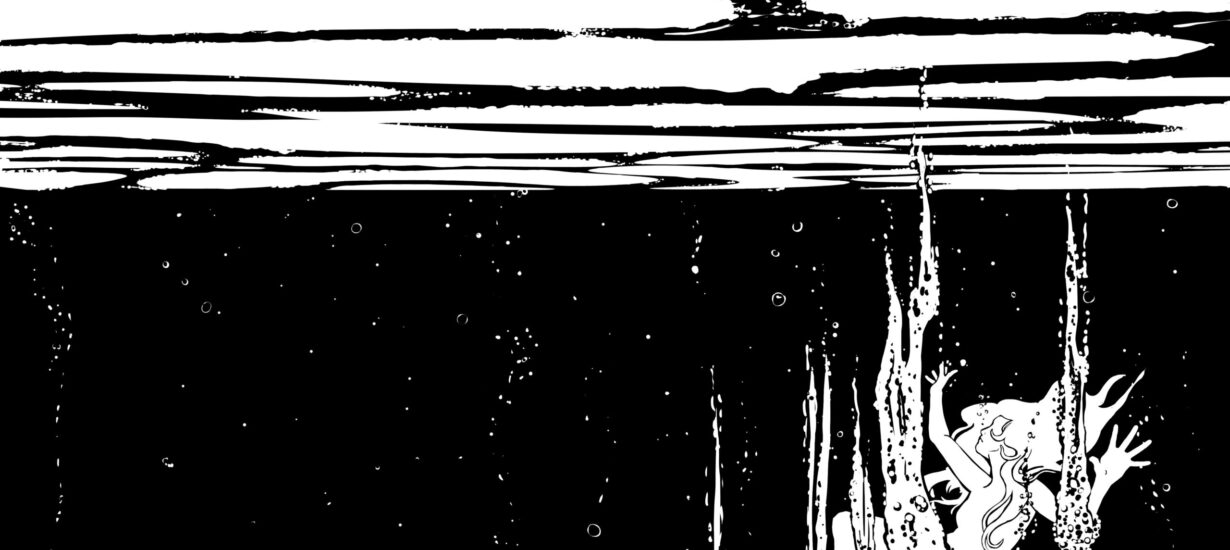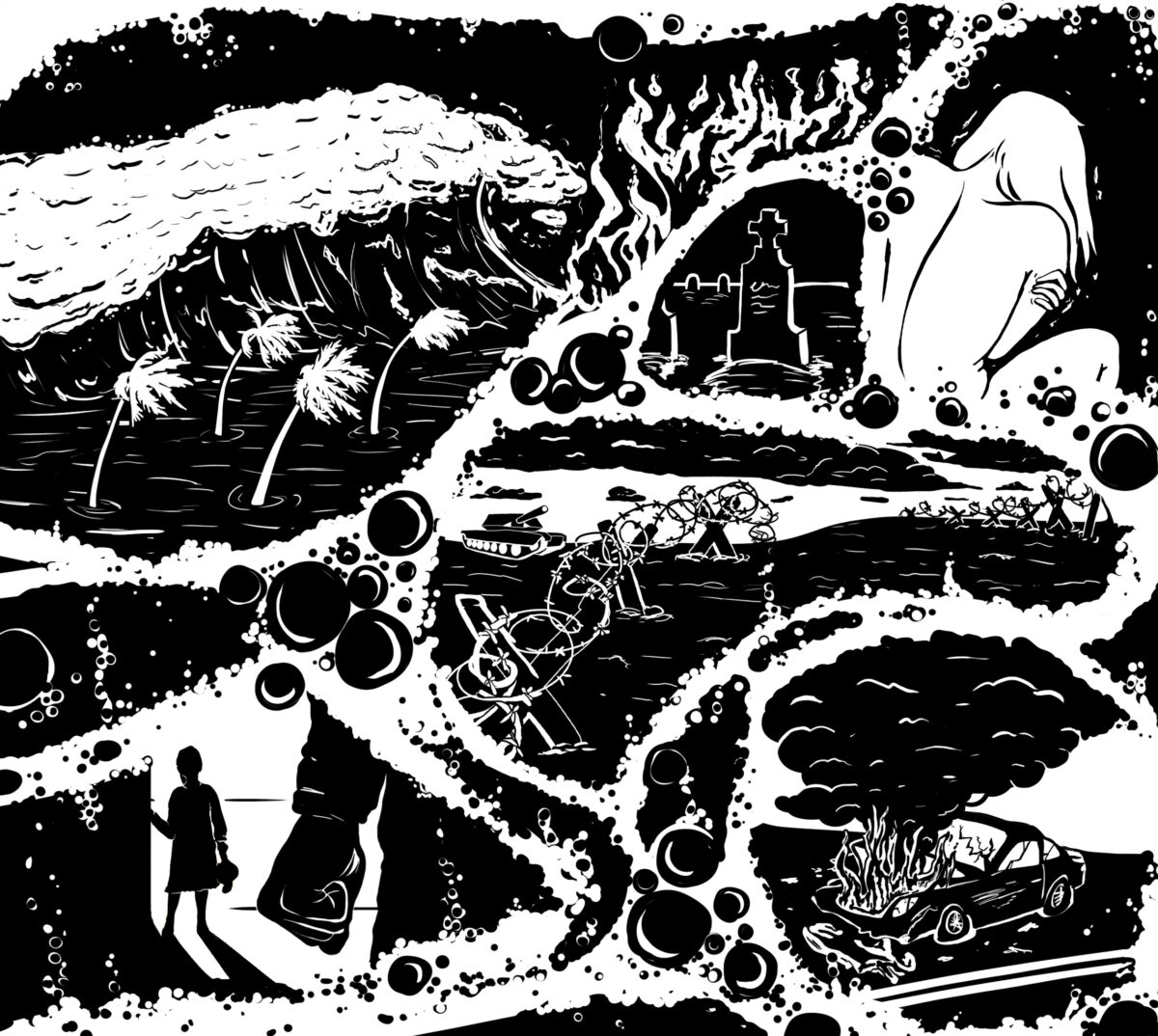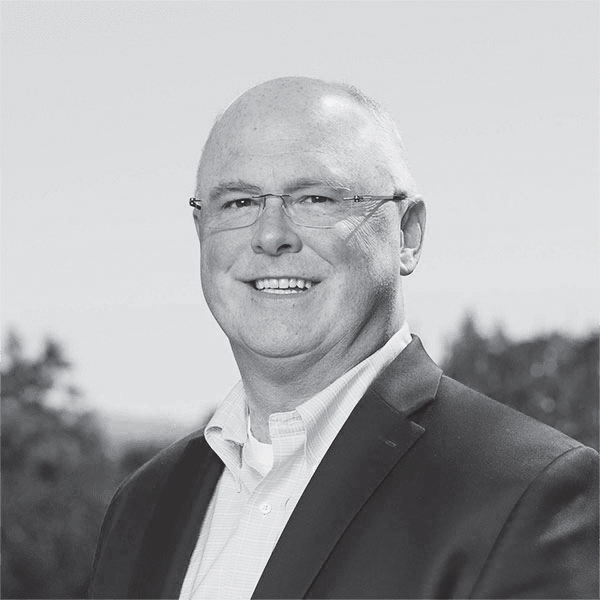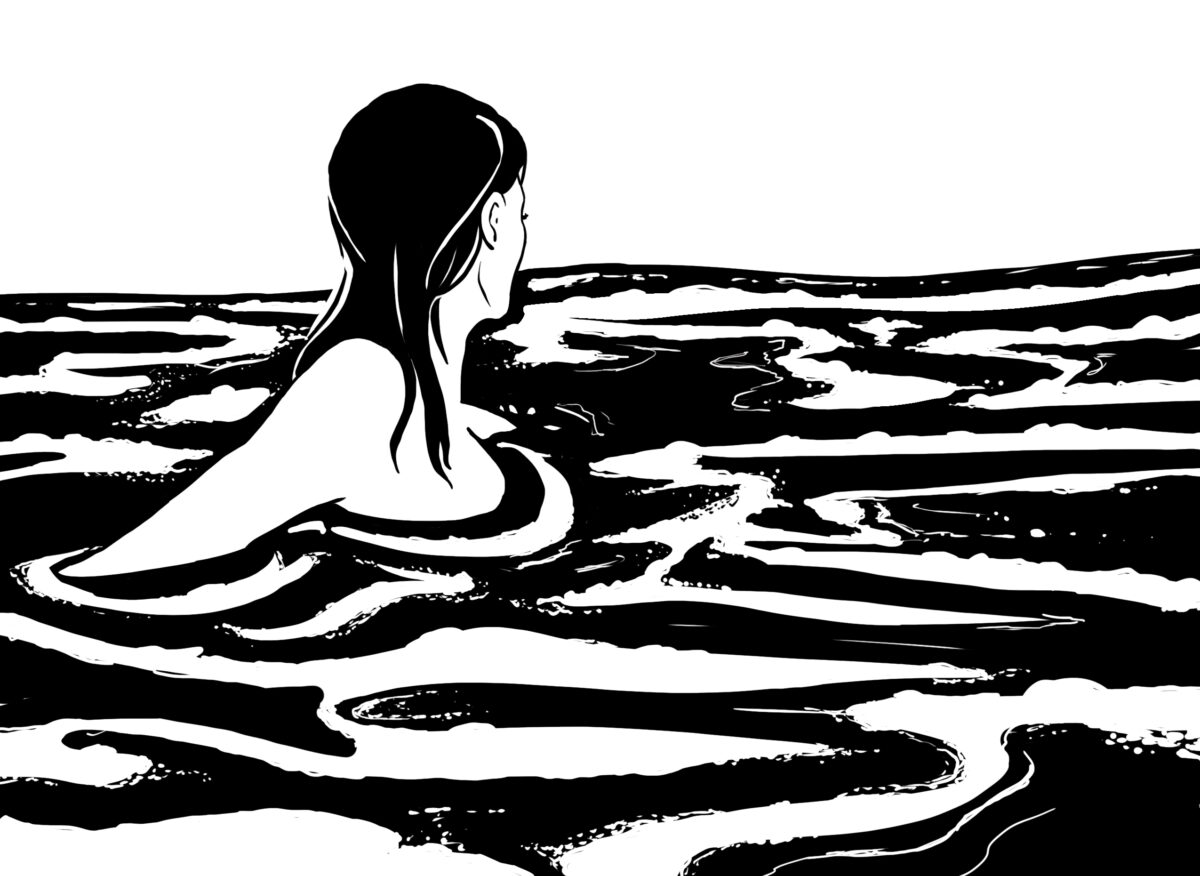A Rolling Boil

PTSD doesn’t just affect soldiers on the battlefield. It’s an epidemic affecting millions of Americans. Here’s what UNC researchers are doing to treat the masses.
by Mark Derewicz
illustrations by Haley Hodges ’19
Your head pounds as sweat drips. Nightmares ruin your sleep and flashbacks wreck your day. You can be anxious, moody, easily triggered, quick to anger, detached from family and friends, emotionally numb, uninterested in the stuff of life you once loved. Hope fades. Shame seeps in. You don’t want to be reminded of what you wish you could forget forever.
These are trauma symptoms. But there are more, and words can’t do them justice. You won’t experience them all at once. They might surprise you when they become overwhelming. Symptoms may stem from one harrowing incident that happened to you a week ago or from many events littering your past. You might not understand why you feel the way you do. No matter what, if you don’t have the means to understand trauma or the tools to transcend its grip on your life, you’ll likely find a way to self-medicate. That’s when psychological pain can ruin lives.
For many people on the health-care frontlines — in hospital emergency departments and psychiatric clinics — the mental health crisis had been rising to a boil for years. When the COVID-19 pandemic hit, the mental health lid was blown off the pot. “We’ve been overwhelmed,” said UNC Psychiatry Chair Samantha Meltzer-Brody ’03 (MPH). “By the end of the first year of the pandemic, our clinical faculty struggled to keep up with the people coming to us for help.”
The needs varied. Anxiety, ADHD and depression were rampant, but Meltzer-Brody and her faculty also saw a big uptick in psychological trauma, due in part to the societal shutdown in 2020.
UNC trauma expert and associate professor Bryte Marziano said, “When people had to stay home, some people were in a healthy home environment and some . . . were not. A lot of people experienced significant distressing events during the pandemic, and sometimes it rose to the level of diagnosable psychological trauma.”

Post-traumatic stress might make you think about soldiers coming home from war, as it should. Unfortunately, according to UNC experts and others, post-traumatic stress affects so many millions more. Traumatic events of childhood and the dramatic events of life that affect so many do not magically heal with time, experts say. They cause psychological trauma that alters a person’s life, sometimes in tragic ways, sooner or later.
UNC psychiatry saw so many people suffering from trauma that they launched the Posttraumatic and Acute Trauma Treatment Program in 2021. Marziano is the clinical director of a seven-person staff of psychologists and social workers who counsel trauma patients and train psychiatry and social work interns, who assist staff to counsel clients each day at various locations in the Raleigh-Durham-Chapel Hill area.
On the research front, the department launched the Institute for Trauma Recovery, led by Sam McLean, who years ago founded the only research network in the country focused on victims of sexual assault. He now leads several large trauma research programs nationwide funded by the National Institutes of Health, the U.S. Department of Defense and nonprofit organizations.
“The medical community has tended to think, ‘Oh, PTSD, that just happens sometimes,’” McLean said. “No. I refuse to accept that. Trauma symptoms stem from a wound — sometimes a physical wound but always a psychological wound. After a physical wound, we know how to prevent an infection that would otherwise kill a person. We need to learn how to prevent trauma that can ruin a person’s life. That’s what we’re working on.”
What is psychological trauma?
Some psychologists think all humans carry trauma — some since infancy when left alone to cry in a dark bedroom, set aside instead of coddled frequently or parented by inadequate adults. Issues of abandonment, feeling unloved or rejected and being neglected affect our psychological development, Marziano said, as do our upbringing and the relationships we were forced to live with, often inside dysfunctional families. But mainstream psychologists would not call that trauma unless such individuals experienced physical, psychological or emotional abuse that led to diagnosable symptoms.
“It’s difficult to say how many instances of trauma occur, as it often goes unreported or undiagnosed,” Marziano said. “But if you consider, for example, that one in five women report being sexually assaulted and many rapes are unreported, then, well, that’s a lot of women who’ve experienced at least one life-altering traumatic event.”
Then consider other causes of trauma: car crashes, gun violence, child abuse, domestic abuse, bullying, emotional abuse, a sudden death of a loved one, natural disasters. Clearly, trauma is common.
“We break down trauma into three categories: acute, chronic and complex,” Marziano said. “All of them involve serious psychological distress.”
Acute trauma results from a single adverse event, such as a school shooting, being raped or surviving a car crash. Depending on the person, a shocking event can cause trauma and lead to post-traumatic stress disorder symptoms. Chronic trauma is prolonged over time and includes domestic violence, emotional abuse or child abuse. Complex trauma stems from long exposure to multiple types of experiences, for instance a history of childhood sexual abuse, and then, later, violence from an intimate partner followed by emotional abuse from a spouse. This kind of trauma often interferes with a person’s emotional and psychological development from an early age, sidetracking people’s lives and making them more susceptible to further psychological trauma later on.
“We see acute and chronic trauma patients, but we see a lot of complex trauma patients,” Marziano said. “And it takes time to help them.”
Marziano’s team first creates an environment that feels genuine, sincere and physically and psychologically safe. The staff is very aware of everything it does, from lighting and art on the walls to the clothes they wear and what they do and say, until it becomes second nature for the benefit of the client.
From there, holistic health care becomes part science, part art. Marziano’s team evaluates the interconnectedness of biological, psychological, social and spiritual factors that help them understand the patient. The team explores the person’s worldview and gains relevant history as delicately and slowly as needed over several sessions to tie together how the person arrived where the person is.
No psychologist would expect complex trauma clients to trust their therapist immediately, said Marziano, who is an integrated clinician, meaning she trained in one theory of psychotherapy but draws from other theories and uses various techniques because every person is an individual. “I’m like a chef, tasting the food to see what ingredients are needed. I don’t just follow a cookbook,” she said. “At the same time, we’re trauma-informed and trauma-specific because trauma is what people are suffering from.”
Helping people unwind their personal psychological depths takes time, as does teaching them tools to live psychologically healthy lives. This demands dedication from the trauma survivor. If the patient is uninsured, it might demand money trauma patients are less likely to have. And it likely will demand treatment beyond trauma. Trauma survivors instinctually want two things: the pain to go away and to feel joy. A common way to achieve both is alcohol. Another is opiates, such as heroin or fentanyl.
Marziano and McLean have their work cut out for them.
His mother’s son

Sam McLean
Sam McLean is a fast-talking ball of energy, a passionate doctor dedicated to solving the complex condition summed up as post-traumatic stress disorder. His path to becoming a national leader on PTSD research began when he was a child and his mother ran the largest social services agency in central Michigan. She would tell him about the problems faced by people he might never meet, but she wanted him to care about them.
She told young Sam about his grandmother, who founded a home for runaway girls in Chicago in the 1920s. She’d ask her son, “What do you think the girls were running away from?” Sam didn’t know. “They were running away from home because someone at home was hurting them,” she’d explain. Sam could barely imagine, but he’d learn.
When his grandmother died, several women at the funeral told Sam just how much she had meant to them. “My mom and her mom worked with people experiencing extreme stress,” McLean said. “This stuck with me, and when I was in my residency, I took an interest in how pain, stress and trauma seemed to be interwoven; they had neurobiology in common.”
After residencies in Boston, McLean started an NIH-funded research program in 2002 at the University of Michigan focused on car crash survivors. In the Ann Arbor emergency room, as nurses and doctors cared for rape victims, McLean wondered whether anyone was researching how to help survivors of sexual assault. The answer was no. Not in Michigan. Not anywhere.
“I was pretty shocked,” McLean said. “There are tons of networks for cancer survivors, heart attack survivors, for just about every survivor. But when he called sexual assault centers and said he wanted to collaborate with their community program to do research, they’d hang up because many women had experienced biomedical revictimization — medical professionals asking their clients questions, not understanding how traumatic the incident was, which wouldn’t help the rape survivor heal, McLean said.
He reflected and called again. He’d say, “Hi, I’m Sam McLean, my mom runs social services, and I grew up in Lansing. I’m an ER doc doing research. I want to help victims of sexual assault.”
Now the counselors didn’t hang up, and McLean could schedule meetings.
At Ann Arbor, McLean set up a small network of 83 women who wanted to tell their stories so clinicians could learn what they experienced.
One woman told researchers she was sitting in her apartment when a man broke in and grabbed her. She resisted, scrambled to the bathroom and locked the door. The man kicked down the door and raped her in the bathroom.
“This horrific incident was so traumatic that she could not go back into that bathroom because it triggered severe flashbacks, as if the rape was happening to her again,” McLean said. “She told us she had to use the gas station bathroom two blocks away.”
McLean’s team worked to find her a different apartment.
Sexual assault research
McLean came to UNC in 2007. The next year he started the Better Tomorrow Network, the first research network in the world dedicated to improving treatments and care for sexual assault survivors. It now includes research sites in 11 states and more than 1,000 women, who say the research experience is positive and empowering. It is the only research network in the country dedicated to women who experience sexual assault.
In 2021, McLean, UNC social medicine professor Mara Buchbinder and some colleagues conducted a study on survivor perspectives and published their findings in an open-access journal article titled, “ ‘I still feel lost’: experiences of women receiving SANE care during the year after sexual assault.” SANE is an acronym for sexual assault nurse examiners, who care for sexual assault victims in the ER.
If a survivor consented to participate in the study, she was asked to complete surveys one week, six weeks, six months and one year after the sexual assault. Researchers analyzed responses and 1,434 open-ended comments from 590 women and categorized the comments into 12 themes, such as daily life, safety, shame and social interactions. Of the 12 themes, the women had the most to say about mental health.
One woman wrote of her assault, “This has changed my life more than I could have ever imagined. These questions ask for ‘one-to-10’ answers, but no number could ever describe the panic of waking up screaming, the fear of leaving my house, the struggle to find care, to shower while drowning in depression, the physical ache I feel in my heart when I think about it, the loss of breath I have when I hear the word ‘rape.’ I just hope you all never forget that this is more than numbers. Thank you for looking into what happens after the night of.”
The main purpose of the paper was to give ER doctors and nurses clear insight into the trauma that victims face following a sexual assault and possibly things to say that could immediately help a sexual assault victim.
“The single most important thing I would tell a trauma survivor is that a lot of people will experience flashbacks and nightmares to the point of thinking they’re going crazy,” McLean said. “Flashbacks and nightmares can increase anxiety and stress and perpetuate other symptoms. Trauma survivors should know they are not going crazy. Flashbacks and nightmares are normal and often resolve with time, and people should know this. I believe it helps them to know it.”
The war on trauma
After McLean spent a decade researching car crash victims and sexual assault survivors, the NIH tapped him in 2016 to lead a $26 million study called Advancing Understanding of Recovery after Trauma — better known as the AURORA study — which includes more than 40 researchers from 19 institutions.
With additional funding from the NIH, the Pentagon and nonprofit organizations such as One Mind, AURORA is now a $40 million project researching how to improve treatment of PTSD, to create prediction tools and to better understand what happens in the brains of PTSD sufferers so scientists can make better treatments and possibly prevent it altogether.
In 2021, McLean’s AURORA group used MRIs to study the brain activity of car crash survivors as they responded to tasks related to social threats, rewards and situations that require restraint. Over six months, participants completed self-assessments of PTSD symptoms, depression, anxiety, impulsivity and disconnection from life. By analyzing each participant’s brain activity profile in relation to his or her mental health outcomes, AURORA researchers found that participants with heightened brain activity related to both threats and rewards reported higher levels of symptoms of both PTSD and anxiety compared with other participants.
That same year, AURORA researchers observed that, in individuals who experienced trauma, those who felt “dissociated” or detached from the lives they had been living were at a much higher risk of later developing severe post-traumatic stress, depression, anxiety, physical pain and social impairment.
Dissociation is the brain’s way of psychologically distancing a person from a traumatic event. It can lead to derealization — when a person feels in a dream state, disconnected from surroundings and even loved ones.
In 2022, AURORA investigators published their most interesting study to date. They scanned the brains of trauma survivors in the initial days and weeks after a traumatic event that landed them in the ER. Study participants who developed the most severe PTSD were the trauma survivors whose scans displayed lower activity in their hippocampus — a brain structure crucial for forming memories of dangerous or safe situations.
“Some survivors have a harder time figuring out if some situations are dangerous or not,” McLean said. “And these are the survivors who go on to develop severe forms of PTSD. They are always on guard, and they struggle with anger, irritability and self-destructive behavior, like drinking too much.”
The spiral, if it cannot be stopped here, will only get worse. McLean said these findings have formed the first step toward helping ER staff prevent severe post-traumatic stress symptoms and outcomes, such as substance addiction.
Running to stand still

“This has changed my life more than I could have ever imagined. These questions ask for ‘one-to-10’ answers, but no number could ever describe the panic of waking up screaming, the fear of leaving my house, the struggle to find care, to shower while drowning in depression, the physical ache I feel in my heart when I think about it, the loss of breath I have when I hear the word ‘rape.’ “
There’s a cliché in films and books about damaged souls turning to alcohol and drugs because they don’t care anymore, so they choose a slow death. The truth is, when someone is traumatized, he or she will seek relief from psychological pain, even without realizing it.
McLean and his AURORA network are trying to develop a medication that stops people from spiraling into the psychological ditch of PTSD and drug abuse. The Pentagon awarded McLean $3 million for a clinical trial to test whether the drug Osanetant by Acer Therapeutics Inc. helps trauma survivors, such as war veterans, avoid the ditch. The defense department also awarded McLean $8 million to continue investigating how traumatic brain injury neurobiologically leads to PTSD symptoms.
Marziano never thought she’d work with trauma victims. After earning her doctorate in psychology, she thought she’d be a college counselor. But a colleague recommended her for an open position in a trauma unit working with sex offenders, including juveniles in Wake County. Marziano didn’t think that was her calling, but she decided to take the job to see where it took her. After eight years, her employer asked that she get trained to work with victims of sexual assault.
“I questioned my efficacy in working with people affected by trauma, but I did it, and it helped me make sense of things,” she said. “I did a lot of family work, helping families try to heal from sexual abuse.”
Marziano met Echo Meyer, professor and vice chair of psychological services in the department of psychiatry, who hired Marziano to help evaluate parents whose children had been taken into state custody and to identify barriers to family reunification.
“The barriers were often trauma-based,” Marziano said. “And the trauma often involved drugs or alcohol or both.”
When a traumatic event happens or a traumatic life unfolds, most people don’t know how to cope with it or even contain it, according to Marziano. They frequently turn to alcohol or drugs as a treatment.
“When a trauma survivor is drinking, they’re trying to activate something in their brains that makes them feel good and makes them stop thinking,’ Marziano said. “I cannot take away their coping mechanism without replacing it with something — and that something takes time to learn.”
The something involves learning skills such as mindfulness and grounding, including breathing techniques.
“Not only is their brain holding on to trauma, but so is their body,” Marziano said. “It’s a cycle; one keeps activating the other. So they need to learn to calm the body and the brain. We teach them thought-stopping techniques.”
Grounding involves learning ways to stay present without always reliving the past full of pain or imagining a future fraught with anxiety.
This is when Marziano can help a trauma survivor learn who he or she is. If single, the person might learn that taking care of a pet provides purpose and meaning. Or the survivor might realize how much he or she loves to paint, write, sing, run, dance or enjoyed a job that was lost. The person might realize a love for adventure and healthy ways to be spontaneous. Simply, the survivor might learn how to “know thyself.”
The word “grounding” is used because this is when trauma survivors plant roots strong enough to withstand the stresses and hardships of life. If a person is not grounded in who he or she is and what is meaningful, the stresses of life can more easily trigger trauma and return the person to unhealthy ways of coping.
Marziano also teaches trauma survivors about the psychology of different types of trauma so they understand what they are experiencing and why, such as when unhealthy, intrusive thoughts begin to swirl or when cognitive distortions begin to alter their reality.
The thing with trauma is that it comes from an emotional wound or many wounds. The wounds happened, and nothing can take away what happened — not drugs, alcohol, therapy or even a psychedelic experience in a desert with the foremost guru of our time.
The wound is a part of who a survivor is, McLean said. But so are the tools that can develop resiliency, purpose and even happiness in the face of trauma, Marziano said.
“I am astonished by the resiliency of trauma survivors,” McLean said. “A long time ago, a woman told us she had to take three buses to get to our research site. And she was poor. We told her if it was too much, she didn’t have to continue.”
Instead, the woman said, “Oh no. I want to come here. This is the most important thing I do in my life. I want to help other women.”
Mark Derewicz is director of research and national news for UNC Health and the UNC School of Medicine, and a freelance writer living in Chapel Hill.
For information on how to support McLean’s sexual assault survivor network, contact megan_henderson@med.unc.edu.
Thanks for reading the Carolina Alumni Review
Carolina Alumni members, sign in to continue reading.
Not yet a member? Become one today.
